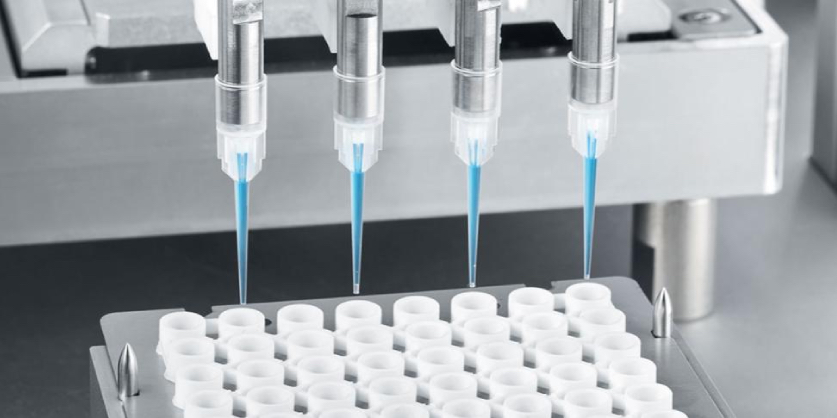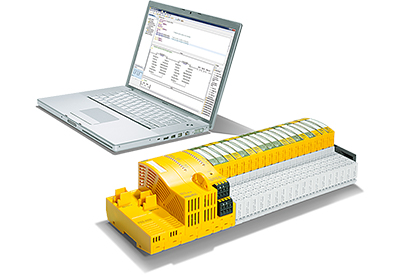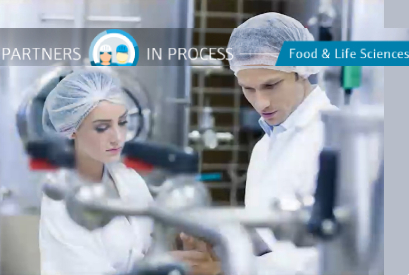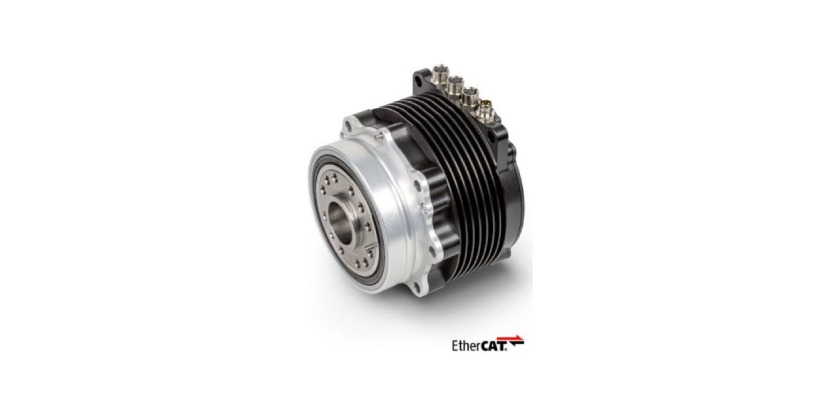Fast MDx and Festo: Saving Lives Worldwide with Low-Cost Molecular Diagnostic Tests
February 27, 2023

High throughput testing for many upper respiratory tract pathogens thanks to automation technology
Fast MDx shows how many pathogens can be detected with unrivalled speed without the need for expensive biosecure laboratories. This near-patient testing system, developed by London-based company Fast MDx, cuts the typical 24 to 48 hour waiting time to just one to two hours. The new system uses automation technology from Festo.
Fast MDx is the first fully automated, high-throughput, near-patient testing system. It will be launched in May 2023 with a multiplexed, CE-IVDr-approved test for the most common respiratory pathogens, influenza A, influenza B, RSV A, RSV B and Covid-19. Further assays will be added to the test menu in the near future. The test platform is usually set up close to the patient in hospitals, clinics or doctors’ surgeries. This saves time, cost and the need to transport samples. “As a result, infected people receive faster personalised treatment.” explains Richard Lewis, founder and CEO of Fast MDx.
Fast, personalised tests
Even though the pandemic no longer seems to be the predominant topic of discussion among the public and governments around the world, it is still important to provide doctors with rapid, reliable and personalised test results. After all, they need to know how to treat patients and who to quarantine to slow the spread of infectious diseases like Covid-19.
“The Fast MDx test platform is mobile and can therefore be used anywhere. Only one technician is required to operate it, rather than the five normally needed in a central laboratory to process up to 1,000 patient samples in an 8-hour shift,” says Lewis.
Richard Lewis, CEO of Fast MDx
Another benefit of this test system is the massively reduced burden on the environment because of shorter transport routes and less vehicle emissions. In addition, the samples do not have to be elaborately double-packaged which then has to be incinerated after having been used only once in order to prevent cross-contamination of samples.
Everything necessary on board
The Fast MDx platform relies on automation technology from Festo for pipetting and dispensing. Automated testing systems save technicians time and reduce the human errors associated with manually pipetting hundreds of samples into standardised tubes and microtiter plates. Fast MDx is a fully integrated system that includes everything needed for the test, from the sample tubes and swabs to the electronic transmission of results to the hospital, clinic, or doctor’s surgery where the sample was originally taken,” explains Lewis.
The company will be expanding the range of tests in 2023/24 to include tests for healthcare acquired infections such as C-Diff and MRSA, as well as for sepsis, which kills about 11 million people worldwide every year. It is also the perfect system for conducting genomic testing, which informs doctors what screening tests to request based on their patients’ own DNA, in order to detect hereditary diseases at an early stage. “This enables patients to make lifestyle changes to avoid the onset of diseases to which they are genetically predisposed,” explains Lewis.
No capital commitment
“The advantage for operators is that the system does not tie up capital, as we will lend the Fast MDx test platform to operators free of charge,” Lewis says of his social enterprise. Thanks in the main to economies of scale, it is the first system in the world to make molecular testing and diagnostics accessible everywhere, not just in more affluent countries.
The tests on the Fast MDx platform are fully automated: Included in the system are handling gantries with electric axes from Festo for precise pipette handling and for robot-assisted handling of the PCR microtiter plates, heat sealing from Kbiosystems and Fast MDx’s patented, ultra-fast qPCR thermal cycler, the NGX2. The Biosero software used on the platform integrates and controls all the modules and makes operating it very easy. The platform is very compact: It only requires 0.7 m x 1 m of floor space. Thanks to lockable casters, it can easily be moved from one place to another.
The British special machine manufacturer Applied Automation is responsible for assembling the complete test system and for all aspects of safety, risk analysis and CE marking.
Operating the Fast MDx test platform
The operator inserts three racks of pipette tips and a 96-well microtiter plate into the Fast MDx platform at the designated locations. The assay kit with all the reagents and controls is simply loaded into an aluminium block and clipped into place. 92 patient samples in Pathtubes® are placed in the platform and are tracked throughout the process using a unique barcode laser-etched on the bottom of each Pathtube®.
During sample preparation, the planar surface gantry EXCM from Festo operates in the X and Y planes. The 92 patient samples are scanned from below using Festo’s optical sensors to track and confirm that all the samples are present. The automated pipetting system, consisting of the Festo DHOE pipetting head and the DHAO disposable syringe ejector, is mounted on the planar surface gantry in Z direction. The pipetting head can accurately dispense volumes in the range of 10 µl and the pipetting speed can be adjusted to dispense up to 10 ml/s.
The master mix is prepared, placed in the microtiter plate and then the samples are added. The disposable tip pierces the Fast MDx’s Pathtube® cap, and aspirates and pipettes each patient sample into the master mix in one of the microtiter plate wells. To avoid cross-contamination, each tip is used for only one patient sample and then discarded. “Piercing the Pathtube® cap saves a lot of time and money, as no conventional opening and closing systems are needed and eliminates the human handling errors that so often happen when manually pipetting hundreds of samples into tubes,” explains Hannes Rößer, handling technology expert at Festo.
Using electric grippers and axes
A separate handling system, based on the EXCM-30 planar surface gantry, uses electric gripper EHPS-16 to pick up the filled microtiter plate and place it in the heat sealer, where it is sealed with a plastic film. The sealed plate is then placed in the RT block, which triggers the conversion of the RNA, if present, into complementary DNA (cDNA).
Finally, the plate is placed in the NGX2 qPCR thermal cycler, where the PCR reaction takes place and the cDNA is amplified. The NGX2 uses an ultrafast fluorescence detection system to determine whether the cDNA sequence of the pathogen of interest is present in any of the patient samples tested.
The test results are made available electronically within 1 to 2 hours to the clinician who ordered the test, so that they can determine the best personalised treatment plan for their patients.
Supply-independent pressure vacuum generator
To avoid having to use an external pneumatic supply, the Fast MDx test platform uses Festo’s PGVA pressure and vacuum generator, which produces a pressure or vacuum of +/-0.5 bar. Only a 24-volt power supply is required to provide a pressure and vacuum solution with compressed air. The PGVA integrates a mini compressor, air filter unit, reservoir and electronic pressure and vacuum control in a very small space, providing a totally self-contained solution for liquid handling in laboratory automation.
“Thanks to the close cooperation between Fast MDx and Festo, we were able to build the first prototypes quickly and efficiently, despite the extremely high degree of complexity,” says Richard Lewis, CEO of Fast MDx. “We were able to combine Fast MDx’s extensive expertise in qPCR thermal cycling with Festo’s proven 3D gantries, controllers and pipetting systems.”
Richard Lewis, CEO of Fast MDx
Related Story
Achieving Matrimony Between Machine Vision and Motion Control in Lab Automation – A Case Study
Mechatronics Canada spoke with Eric Rice, Product Market Manager – Electric Automation at Festo, to discuss a case study where a customer recently chose Festo to help them implement machine vision with a motion control system to automate their industrial application. This article looks at what they wanted to automate and why, explores some of the challenges that needed to be overcome, and discusses the solutions Festo offered to help them achieve their goals.




